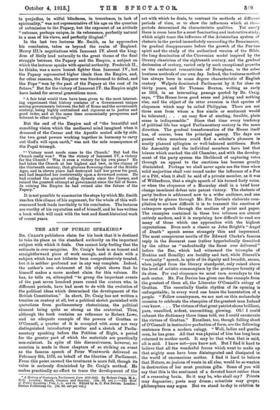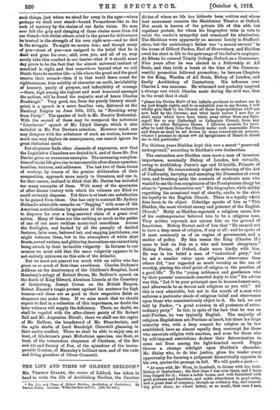THE ART OF PUBLIC SPEAKING.* DR. CRAIG'S publishers claim for
his book that it is destined to take its place as the standard authority on the important subject with which it deals. One cannot help feeling that the estimate is over-sanguine. Dr. Craig's book is an honest and straightforward piece of work enough, and it deals with a subject which has not hitherto been comprehensively treated, but it is neither profound nor in any way complete. Indeed, the author's own statement of his object shows that he himself makes a more modest claim for this volume. He has, he tells us, attempted "to group the important events of the past seven hundred years round the orators who, in different periods, have had most to do with the evolution of the political ideas which determined the development of the British Constitution." In short, Dr. Craig has not written a treatise on oratory at all, but a political sketch garnished with quotations from parliamentary rhetoricians, the political element being quite as strong as the oratorical. Thus, although the book contains no reference to Robert Lowe, and no adequate example of the powers of Grattan or O'Connell, a quarter of it is occupied with some not very distinguished introductory matter and a sketch of Parlia- mentary speaking before the Petition of Right, a period for the greater part of which the materials are practically non-existent. In spite of this discursiveness, however, no mention is made in these chapters of so striking an event as the famous speech of Peter Wentworth delivered on February 8th, 1576, on behalf of the liberties of Parliament. From this point onward the treatment is more fall, though its value is seriously diminished by Dr. Craig's method. He makes practically no effort to trace the development of the
• A Histonj of Oratory in Parliament from 1213-1913. By Robert Craig, D.D. London: Heath, Cranton and Ouseley. [10s. 6d. net.] —The Book 01 Public Speaking: Vole. and iii. Edited by A. C. Fox Davies. London: Caxton Publishing. Co. [8s. 6d. net per vol.] art with which he deals, to contrast its methods at different periods of time, or to show the influences which at those periods determined its characteristic qualities. Yet surely there is room here for a most fascinating and instructive study, which might trace the influence of the Aristotelian system of rhetoric in the period immediately succeeding the Renaissance, its gradual disappearance before the growth of the Pur.tan spirit and the study of the authorized version of the Bible, the long domination of the Ciceronian model inspired by the literary classicism of the eighteenth century, and the gradual declension of oratory, varied only by such exceptional growths as the exuberant romanticism of Brougham, to the sober business methods of our own day. Indeed, the business method has always been in some degree characteristic of English oratory. Walpole dominated Parliament by it for close on thirty years, and Sir Thomas Buxton, writing as early as 1819, in an interesting passage quoted by Dr. Craig. says, " The House loves good sense and joking and nothing else, and the object of its utter aversion is that species of eloquence which may be called Philippian. There are not three men from whom a fine simile or sentiment would be tolerated ; . . . an easy flow of sterling, forcible, plain sense is indispensable." Since that time every tendency of political life has urged Parliamentary oratory in the same direction. The gradual transformation of the House itself has, of course, been the principal agency. The days are passed when members could find a scholar's pleasure in neatly planned syllogism or well-balanced antithesis. Both the Assembly and the individual members have lost that leisure which marked the old Chamber, and with the develop- ment of the party system the likelihood of capturing votes through an appeal to the emotions has become greatly diminished. Perhaps we shall never again see the time when solid majorities shall veer round under the influence of a Fox or a Pitt, when it shall be said of a private member, as it was of Wilberforce, that a single speech of his turned forty votes. or when the eloquence of a Macaulay shall in a brief hour change imminent defeat into patent victory. The rhetoric of party leaders is addressed now to a wider audience, and one has only to glance through Mr. Fox Davies's elaborate com- pilation to see how difficult it is to transmit the emotion of extempore speech through the medium of print and paper. The examples contained in these two volumes are almost entirely modern, and it is surprising how difficult to read are many of those which one approaches with the highest expectations. Even such a classic as John Bright's "Angel of Death" speech seems strangely thin and impersonal. The most conspicuous merits of Sir Edward Clarke's famous reply in the Baccarat case (rather hyperbolically described by the editor as "undoubtedly the finest ever delivered" before the Bar, which had witnessed the triumphs of Erskine and Romilly) are lucidity and tact, while Disraeli's " verbosity " speech, in spite of its dignity and breadth, seems, when judged from the literary standpoint, only raised above the level of artistic commonplace by the grotesque ferocity of its close. For real eloquence we must turn nowadays to the mob orator. Mr. Fox Davies has given one fine example from the greatest of them all, the Liberator O'Connell's eulogy of Grattan. The essentially Gaelic rhythm of its opening is unforgettable ; in every word one hears the lamentation of a people. " Fellow countrymen, we are met on this melancholy occasion to celebrate the obsequies of the greatest man Ireland ever knew. . . . The virtues of that great patriot shone brilliant, pure, unsullied, ardent, unremitting, glowing. Oh ! I could exhaust the dictionary three times told, ere I could enumerate the virtues of Grattan." Excellent, too, though falling short of O'Connell in instinctive perfection of form, are the following sentences from a modern eulogy. " Well, ladies and gentle- men, he has gone. All that was physical of him has long been returned to mother earth. It may be that when that is said, all is said. I know not—you know not. But I find it bard to believe that all the wonderful forces which went to make up that mighty man have been disintegrated and dissipated in the world of unconscious matter. I find it hard to believe that Nature, so jealous of waste in all else, would be so wanton in destruction of her most precious gifts. Some of you will say that this is the sentiment of a devoted heart rather than of a reasoning brain. So it may be, who shall say P Priests may dogmatize ; poets may dream ; scientists may grope ; philosophers may argue. But we stand to-day in relation to
mach things, just where we stood far away in the ages—where perhaps we shall ever stand—bound Prometheus-like to the rock of mystery by the chains of our finite vision. No man ever felt the grip and clanging of those chains more than did our friend—but whilst others cried to the priest for deliverance he trusted in the strength of his own right arm—and he died in the struggle. To-night we mourn him ; and though many of you—most of you—are resigned to the belief that he is dead and gone for ever ; still, even you, and all of us, may surely take this comfort to our hearts—that if it should some day prove to be the fact that the almost universal instinct of mankind is right, and that somewhere beyond what we call Death there be another life—a life where the great and the good receive their reward—then if in that world there count for righteousness, true nobility of character on earth, inviolability of honesty, purity of purpose, and inflexibility of courage —there, high among the highest and most honoured amongst the noblest, will be found the majestic soul of brave Charles Bracllaugh." Very good, too, from the purely literary stand- point, is a speech in a more familiar vein, delivered at the Hackney Empire on June 10th, 1911, on "Breaking away from Party." The speaker of both is Mr. Horatio Bottomley. With the second of these may be compared the notorious " Limehouse " speech of Mr. Lloyd George, which is also included in Mr. Fox Davies's selection. However much one may disagree with the substance of such an oration, however much one may deplore its consequences, one cannot ignore its great rhetorical merit.
But eloquence finds other channels of expression, now that the Legislative Chambers are denied to it, and of these Mr. Fox Davies gives us numerous examples. The increasing complica- tions of social life give rise to innumerable after-dinner speeches, homilies, lectures, and addresses. The last two of these forms of oratory, by reason of the greater deliberation of their composition, approach more nearly to literature, and one is, for that reason, inclined to think that Mr. Davies has included too many examples of them. With many of the specimens of after-dinner oratory with which his volumes are filled we could certainly dispense. Yet there is at least one satisfaction to be gained from these. One has only to contrast Mr. Sydney Holland's admirable remarks on " Begging " with some of the American contributions by speakers of the greatest eminence to disprove for ever a long-asserted claim of a great rival nation. Many of these are like nothing so much as the patter of one of our more reckless music-hall comedians. Across the footlights, and backed by all the panoply of daubed features, false nose, battered hat, and sagging pantaloons, one might welcome them, but in the atmosphere of white shirt fronts, cowed waiters, and glittering decorations one cannot help being struck by their invincible vulgarity. In fairness to our cousins we must add that the same vulgarity appears to be not entirely unknown on this side of the Atlantic.
But we must not quarrel too much with an editor who has given us so much of first-class excellence. Charles Dickens's Address on the Anniversary of the Children's Hospital, Lord Bosebery's eulogy of Robert Burns, Mr. Balfour's speech on the death of King Edward, Abraham Lincoln at the Cemetery of Gettysburg, Joseph Cowen on the British Empire, Robert Emmet's tragic protest against his sentence for high treason—all these are as good in their respective fields as eloquence can make them. If we miss much that we should expect to find in a collection of this importance, no doubt the later volumes will supply the deficiency. There, no doubt, we shall be regaled with the after-dinner gaiety of Sir Robert Ball and Mr. Augustine Birrell ; there we shall see the rapier of Mr. Balfour, the broadsword of Mr. Chamberlain, and the agile shafts of Lord Randolph Churchill gleaming in their native conflict. There we shall be able to enjoy one, at least, of Gladstone's great Midlothian speeches, one flash, at least, of the tremendous eloquence of Chatham, of the fire and wit and fluency of Fox, of the splendour of the incom- parable Grattan, of Macaulay's brilliant ease, and of the rude and living grandeur of Oliver Cromwell.



































































 Previous page
Previous page